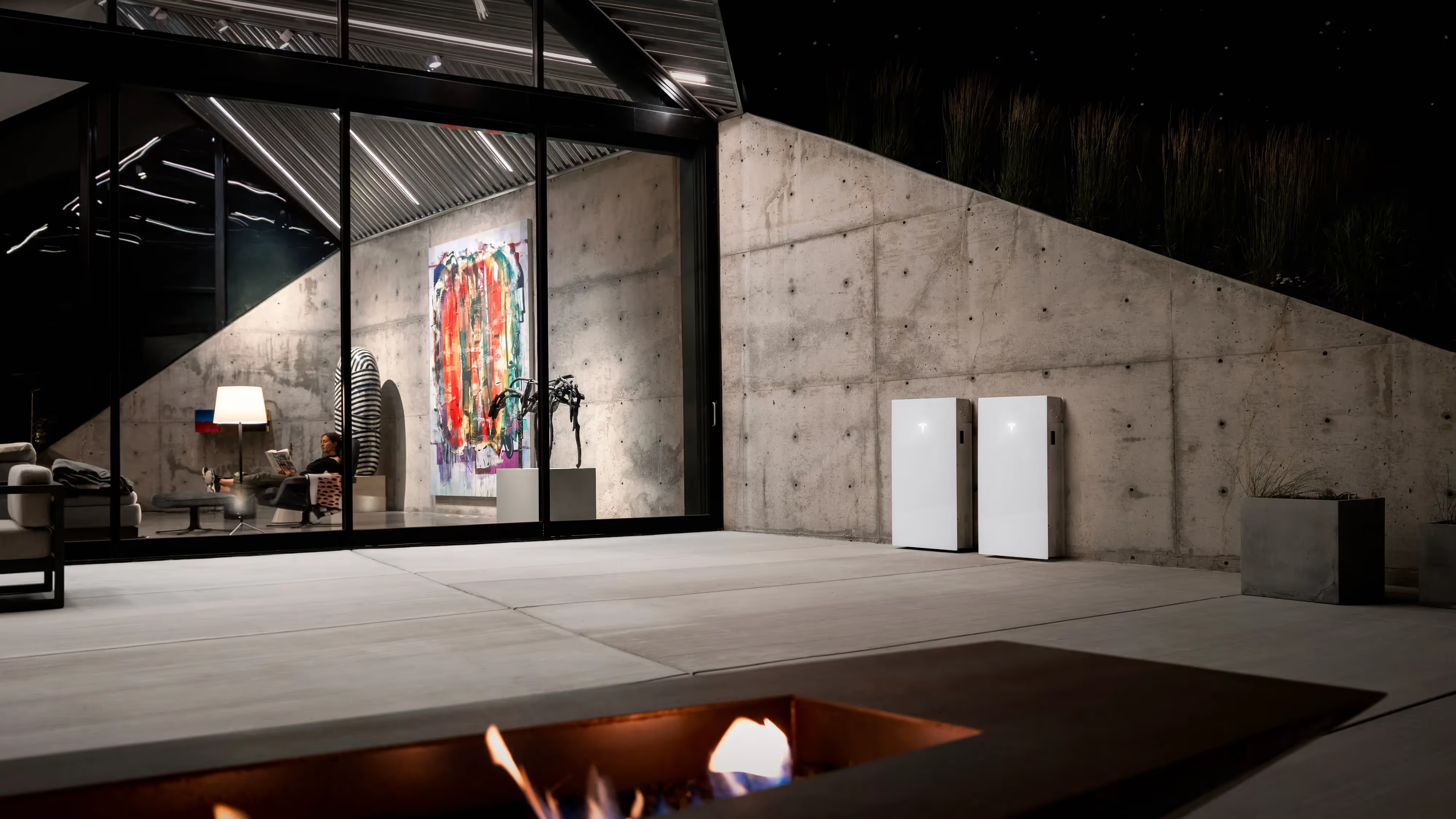What Size Solar Storage Battery Do I Need?

Thinking about solar?
Curious what solar panels could save you? Get a quick estimate based on your home, and see if solar makes sense for you.
In Summary: Solar Battery Sizing & Cost
Determining what size solar battery you need isn’t exactly easy. In summary, you have 3 main options:
- Small 5kWh battery - suitable for those looking for the best balance of energy production, self-sufficiency and cost
- Medium 10kWh battery - great for medium electricity consumption households
- Large 15kWh battery - perfect for large properties with high electricity consumption, or, those using high consumption appliances such as hot tubs or air conditioning units
Solar batteries are known for being expensive, so you’ll want to pick the right one. Small batteries cost around £2,495, a medium unit costs in the region of £3,745 and a large battery will set you back approximately £4,995.

Not sure what size solar battery you need?
Use our clickable solar panel tool here. There you can toggle between different battery sizes to determine the overall cost of your solar panel system. You’ll also see figures for estimated energy self-sufficiency and potential energy bill savings.
Or, speak to one of our solar experts here. They’ll be able to advise which is the best setup for your property based on your energy usage and budget.
Common Solar Storage Battery Sizes
Solar panel systems from top installers come with a range of options when it comes to upgrades. Common upgrades on offer from most solar panel installers include:
- Inverters (upgrading from string inverters to micro or hybrid inverters)
- Power optimisers
- Smart heating controls
- And of course…solar storage batteries
Just to be clear, you don’t have to install a solar storage battery. However, if you do plan to add one, you’ll need to know what size solar storage battery you need.
Most installers offer the 3 main options when it comes to solar battery sizing, with sizes in the region of:
- Small (5-6kWh)
- Medium (10-11kWh)
- Large (15-16kWh)
When determining what size battery you need, remember with most solar batteries, the full capacity is not available for use.
You'll need to check the DoD (Depth of Discharge) specs for the unit you plan to purchase. Typically, solar batteries have a DoD of around 80%. Once you've used 80% of its capacity, it will need recharging before using it again.
Determining precisely what size battery you need isn’t exactly easy. Each property will have different electricity demands, at different times of the day.
Using our clickable solar panel tool here you can flick between options (no battery, small, medium or large) to determine how that affects your system’s self-sufficiency rating.
Using a 5.16kW 12-panel system without a solar battery will provide just over 20% self-sufficiency. However, upgrading your system to incorporate even a small 5.3kW storage battery will bump this self-sufficiency rating to over 50% for an average household.
Balancing Upfront Cost vs. Electricity Bill Savings
Storage batteries for solar panel systems are expensive. So, you’ll want to do your best to balance what you’ll be saving on your electricity bills vs the upfront cost of buying the battery.
The cost depends on what size solar battery you need. The bigger the battery, the higher the price.
Again, here are some guidelines of what you should expect to pay if you pick a battery from a leading brand (such as Sunsynk or Alpha):
- Small 5.3kWh battery: £2,495
- Medium 10.6kWh battery: £3,745
- Large 15.9kWh battery: £4,995
As you can see using our clickable solar panel tool here, what you’ll save will vary depending on your: electricity consumption, what size battery you choose and if you’re signed up to the Smart Export Guarentee (SEG) so you can sell energy back to the grid.

The figures above are estimates. They compare a property not using a solar panel system with a property using a 5.16kW setup alongside a small 5.3kWh storage battery.
As you can see in this example, you’d expect to save somewhere in the region of £700 per year. And with that, the total cost of your solar panel system is likely to be paid off within 11-12 years.
Of course there are lots of factors that affect the exact amount of money you’ll save including:
- Your roof pitch and orientation - a roof facing due south and with a 30 degree tilt angle is the most productive in terms of electricity production
- Electricity consumption - your exact electricity consumption and when you use it has a huge bearing on how much you’re likely to save
- Current electricity tariff - electricity tariffs vary from supplier to supplier, for those on an expensive tariff, savings could be higher than mentioned above and vice versa
When balancing cost vs energy bill savings, a typical household consuming up to 4,500kWh of electricity per annum is generally most suited to a 5.3kW solar storage battery. These add on £2,495 to the total installation cost of solar panels, but give a large bump in energy self-sufficiency.
Read more about the overall cost of solar panel installation here.
How To Calculate What Size Solar Battery You Need
Ofgem have this useful table that highlights average electricity consumption throughout the UK:

As you can see a typical household is going to use anywhere from 2,700kWh to 4,100kWh of electricity per annum. For these properties a 5.16kW solar panel system is going to be most suitable.
A typical 5.16kW solar panel system will be made up of 12 panels. Our systems come complete with:
Expect a system without a storage battery to cost around £6,000 including installation.

So, what size solar battery do you need if you're an average electricity consumption household? Typically we’d suggest either a small or medium storage battery.
A small battery (5.3kWh) will cost an additional £2,495. However, you’ll see self-sufficiency ratings jump dramatically from around 20% without a battery, to over 50% with a 5.3kWh unit.
If you want further self-sufficiency and don’t want to rely on the grid for your electricity, you’ll want a medium 10.9kWh battery. These units will add £3,745 to the overall installation price, but you’ll see self-sufficiency ratings jump to around 70%.
You can toggle through options using our clickable solar panel tool here. You’ll be able to see how self-sufficiency ratings and price changes for your system, based on battery size and whether or not you want an optimised system.
When Would You Need A Large Solar Storage Battery?
One thing worth considering is when it's the right decision to either:
- Purchase the biggest battery possible
- Increase the size of your solar array (i.e. add more panels)
Typically, both options are suitable if you have high consumption appliances in your household.
Generally, the average appliance in your home doesn't use a whole lot of electricity. Those that use the most tend to be units offering either heating or cooling.
The biggest drains come from the likes of hot tubs and air conditioning units.
A small 5.3kWh battery may be just enough to support the average household overnight until solar panels can produce more electricity. However, a typical hot tub and air conditioning unit could easily completely drain this battery within a couple of hours.
As an example, a typical hot tub (when on maximum power) will drain in the region of 2-4kW per hour. An air conditioning unit isn't much better, with the majority of units being in the 2-3kW range. Obviously they don’t work at maximum power all the time, but it's easy to see how they can quickly drain electricity from your solar battery.
So, what size solar battery do you need if you have air conditioning units or a hot tub?
As big as possible.
And alongside this, you can shift the load during times when your panels aren’t productive (at night). For instance, with a hot tub you could set it to eco mode overnight so it doesn’t drain your solar battery completely.
Speak to one of our solar experts here. They'll be able to determine the best setup for your property. This might mean using a larger solar array (more panels), plus a large 15kWh battery.
Solar Storage Battery Sizing FAQ
What will happen if my solar battery is too small?
Solar batteries have limited cycles in their lifespan. Fitting a battery that’s too small will mean it goes through cycles quickly and its lifespan (in years) will be reduced dramatically.
Alongside this, you’ll be reliant on the grid for any additional electricity (at a cost) you need.
What happens if my solar battery is too big?
The difference between a small battery (£2,495) and a large battery (£4,995) is substantial.
Not using anywhere near a battery’s capacity will simply mean you’ve spent money that you didn’t have to.
How long will a solar battery last during a power cut?
This depends on your energy consumption.
Stick to low wattage appliances (avoid using hot tubs, kettles, dryers and air conditioning units) and a 10kWh battery could power your household for 12-24 hours.
What size battery do I need to power an AC unit or hot tub?
These appliances consume masses of electricity; 2-5kW when working at maximum capacity.
On full power, a hot tub or AC unit could drain a solar battery within a few hours. Think about load shifting (turn off, or, onto eco mode at night), allowing the majority of energy consumption to happen during the daytime, when your solar panels are productive.
Alternatively, you could purchase a large battery (15kWh or higher), or link multiple batteries together.
What does total capacity vs. usable capacity mean?
Batteries have a DoD (Depth of Discharge) rating. Essentially, it's the figure specified by the manufacturer whereby the battery should be recharged again before use.
A typical solar storage battery has a DoD of 80%. So, a 10kWh battery will need recharging when it's down at 2kWh. Essentially, this means you’ll need to slightly overspec your battery…
And that’s it for our guide to what size solar storage battery you need.
Got questions about battery sizing? Speak to our experts here.
Looking to get quotes on a system with a solar battery? Use our clickable solar panel tool here.


